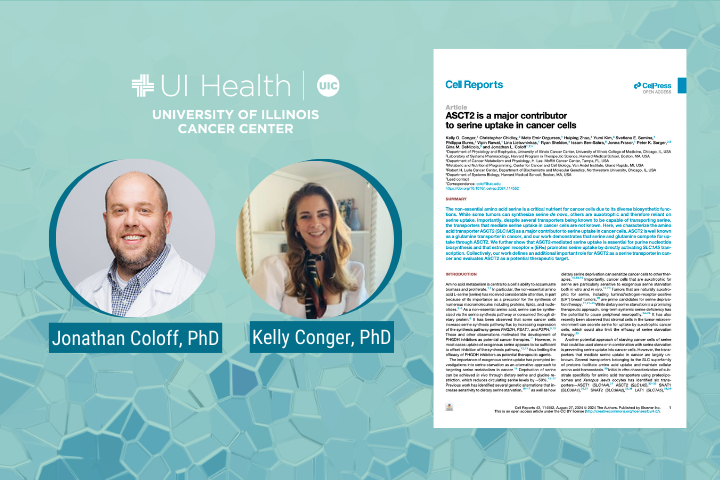
Jonathan Coloff, PhD, co-leader of the Cancer Biology Research Program at the University of Illinois Cancer Center, is corresponding author of a paper published in the journal Cell Reports.
The study, “ASCT2 is a Major Contributor to Serine Uptake in Cancer Cells,” includes other authors affiliated with the Department of Physiology and Biophysics at the University of Illinois College of Medicine Chicago, where Coloff is an Associate Professor. The study’s first author, Kelly Conger, PhD, previously worked in Coloff’s lab and is now a laboratory scientist at Alto Neuroscience in Chicago, and Mete Emir Ozgurses is a PhD student mentored by Coloff in the Graduate Education in Biomedical Sciences (GEMS) Program.
The study summary is excerpted below. To read the full study, click the link here.
“The non-essential amino acid serine is a critical nutrient for cancer cells due to its diverse biosynthetic functions. While some tumors can synthesize serine de novo, others are auxotrophic and therefore reliant on serine uptake. Importantly, despite several transporters being known to be capable of transporting serine, the transporters that mediate serine uptake in cancer cells are not known. Here, we characterize the amino acid transporter ASCT2 (SLC1A5) as a major contributor to serine uptake in cancer cells. ASCT2 is well known as a glutamine transporter in cancer, and our work demonstrates that serine and glutamine compete for uptake through ASCT2. We further show that ASCT2-mediated serine uptake is essential for purine nucleotide biosynthesis and that estrogen receptor α (ERα) promotes serine uptake by directly activating SLC1A5transcription. Collectively, our work defines an additional important role for ASCT2 as a serine transporter in cancer and evaluates ASCT2 as a potential therapeutic target.”
Other study authors are from the Robert H. Lurie Comprehensive Cancer Center of Northwestern University, the Moffitt Cancer Center in Tampa, Florida, and Harvard Medical School, including Peter Sorger, PhD, who was among the featured speakers at the University of Illinois Cancer Center’s annual Dr. Gary Kruh Cancer Research Symposium in April.
